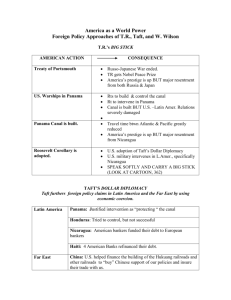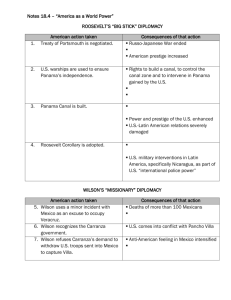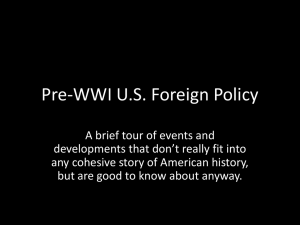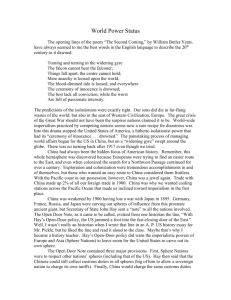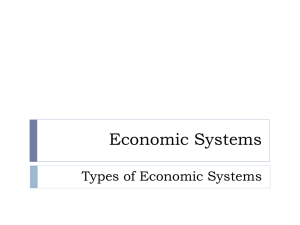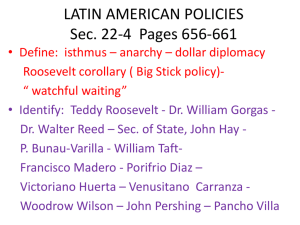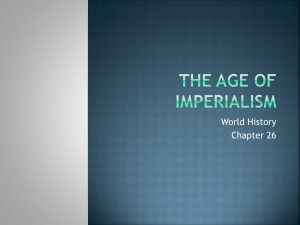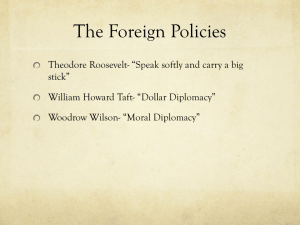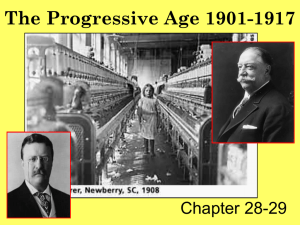Brinkley CH 22-
advertisement
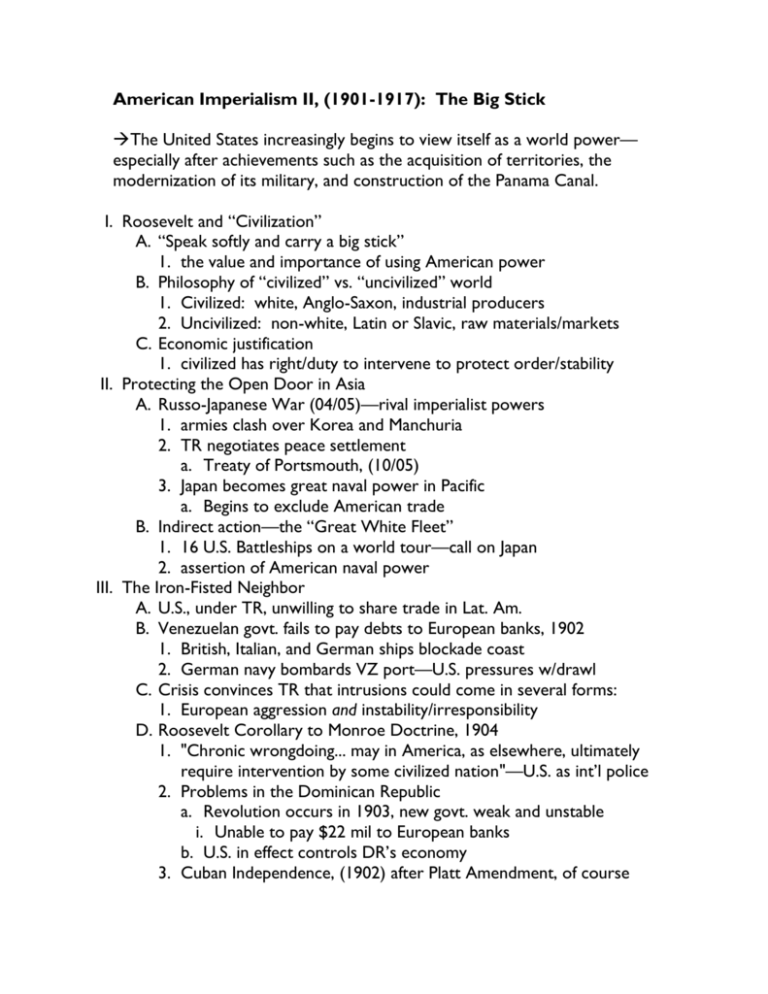
American Imperialism II, (1901-1917): The Big Stick The United States increasingly begins to view itself as a world power— especially after achievements such as the acquisition of territories, the modernization of its military, and construction of the Panama Canal. I. Roosevelt and “Civilization” A. “Speak softly and carry a big stick” 1. the value and importance of using American power B. Philosophy of “civilized” vs. “uncivilized” world 1. Civilized: white, Anglo-Saxon, industrial producers 2. Uncivilized: non-white, Latin or Slavic, raw materials/markets C. Economic justification 1. civilized has right/duty to intervene to protect order/stability II. Protecting the Open Door in Asia A. Russo-Japanese War (04/05)—rival imperialist powers 1. armies clash over Korea and Manchuria 2. TR negotiates peace settlement a. Treaty of Portsmouth, (10/05) 3. Japan becomes great naval power in Pacific a. Begins to exclude American trade B. Indirect action—the “Great White Fleet” 1. 16 U.S. Battleships on a world tour—call on Japan 2. assertion of American naval power III. The Iron-Fisted Neighbor A. U.S., under TR, unwilling to share trade in Lat. Am. B. Venezuelan govt. fails to pay debts to European banks, 1902 1. British, Italian, and German ships blockade coast 2. German navy bombards VZ port—U.S. pressures w/drawl C. Crisis convinces TR that intrusions could come in several forms: 1. European aggression and instability/irresponsibility D. Roosevelt Corollary to Monroe Doctrine, 1904 1. "Chronic wrongdoing... may in America, as elsewhere, ultimately require intervention by some civilized nation"—U.S. as int’l police 2. Problems in the Dominican Republic a. Revolution occurs in 1903, new govt. weak and unstable i. Unable to pay $22 mil to European banks b. U.S. in effect controls DR’s economy 3. Cuban Independence, (1902) after Platt Amendment, of course a. U.S. uses military to quell pockets of instability on island IV. The Panama Canal A. TR’s most celebrated achievement is linkage of Atlantic and Pacific 1. Nicaragua initially proposed as site of canal a. Isthmus of Panama in Colombia favored i. French company had failed—significant progress, however 2. TR dispatches Sec. of State John Hay to negotiate w/ Colombia a. Proposes 6 mile wide canal “zone” for $10 mil and rent b. Colombian senate balks, even after official signs agreement B. Panamanian Revolt, 11/03 1. Allied with Philippe Bunau-Varilla, U.S. supports insurrection a. Bunau-Varilla is chief engineer of French project 2. USS Nashville lands troops in Panama to “maintain order” a. Intimidation of Colombian soldiers—rebellion proceeds b. U.S. recognizes Panamanian independence—legitimization c. Terms of canal treaty accepted—finished in 1914 V. Taft and “Dollar Diplomacy” A. Taft/Sec. of State Philander C. Knox favor $ investment to coercion 1. Nicaragua Occupation (1909) symbolizes tactic a. Revolution breaks out—U.S. backs rebels and seizes customs b. When peace restored, U.S. banks offer loans to new govt. i. New rebellion several months later, pro-U.S. govt. protected a) Troops remain for decades VI. Diplomacy and Wilsonian Morality A. Similarities with TR/Taft? examples: 1. Interventions in Hispaniola—Dominican Republic and Haiti a. DR: Military govt. established after resistance to U.S. influence i. Troops remain for 8 years b. Haiti: marines sent in to quell uprising—U.S. drafts constitution i. Forces remain until 1934 2. Purchase of Virgin Islands from Denmark 3. Nicaragua: Patt”esque” treaty regarding canal building B. Forging his own Foreign Policy 1. Mexico a. Profirio Diaz, corrupt dictator, but favored by U.S. i. Strong connections with U.S. business leaders b. Francisco Madero ousts (1910), promises democratic reform i. Am. businesses hostile to Madero c. Victoriano Huerta, reactionary general, encouraged by U.S. i. As Taft prepares to recognize, govt. murders Madero ii. Wilson takes office, decries “butchers”, hopes to ignore d. Venustiano Carranza and the Constitutionalists i. favored by Wilson, they oppose dictatorship under Huerta e. Wilson becomes more assertive—Veracruz incident, 4/14 i. American sailors seized by Mexican Army in Tampico a) Almost immediately released ii. Wilson seizes port of Veracruz—clash kills many iii. Huerta loses power, Mexico City, flees country f. Carranza takes power, cool to U.S. guidelines for new govt. i. Wilson ponders backing Pancho Villa, former ally of Carranza g. Villa, betrayed, leads raids in retaliation i. Gen. John J. Pershing to pursue—battle Mexican troops ii. Brink of full scale war? w/drawl, recognition Conclusions? TR, Taft, and Wilson contribute to an expansion of active role in int’l affairs. This is done mostly to aid growth of U.S. capitalism, but also to impose standards of morality and democracy. Similar mixtures of ideals and self-interest may soon prove disastrous for U.S.
